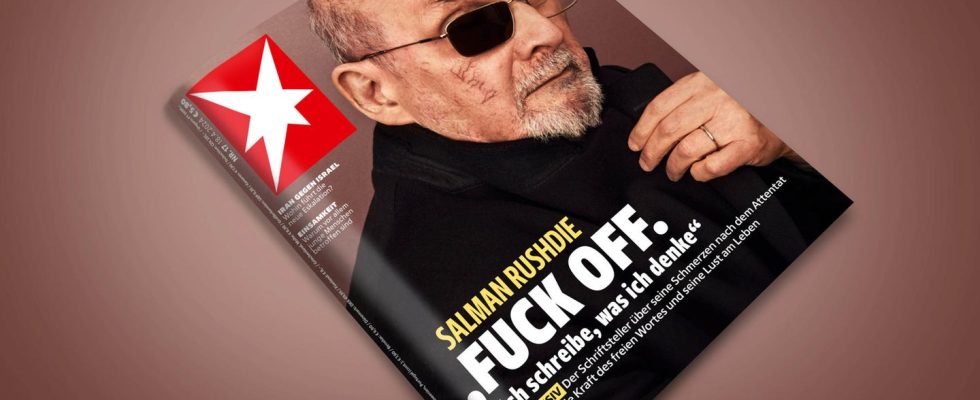Editor-in-Chief
The attack didn’t take away Salman Rushdie’s sense of humor – Gregor Peter Schmitz on the current star
“The assassination attempt and its consequences didn’t make me stronger, it made me weaker,” says Salman Rushdie in the star-April 18 edition
© star
In 2022, Salman Rushdie was almost killed in a knife attack by an assassin. The Iranian regime had previously called for his death – just as it is now calling for the destruction of Israel.
Salman Rushdie is a person who loves life, who embraces humor, for whom a life in hiding would not be a life. That’s how he has done it since an incredible 35 years ago when Iranian rulers around Ayatollah Khomeini (whose greatest enemy was jokes) called for his death because of his book “The Satanic Verses”, which they admitted they had never read. After all these years, a young man – who, by the way, also confessed to not knowing the book – almost killed him with a knife in August 2022.
Salman Rushdie feels like a winner
Rushdie fought for survival for a long time, scars remain, he lost an eye. “The assassination and its aftermath didn’t make me stronger, it made me weaker,” says Rushdie. Almost worse: many would now reduce his life to this one book again, he said at the meeting in New York. That’s why Rushdie would much rather talk about his new, his 22nd work (published by Random House, which like… star belongs to Bertelsmann), in which he writes about the knife and violence, but above all in a touching and almost cheerful way about his joy in life and love. Rushdie feels victorious because he got his life back, unlike the assassin. And, it quickly became clear, he hadn’t lost his sense of humor: he was lucky that his assassin was simply a very bad knife stabber.
As we completed this interview, which also centered on a former Iranian regime’s call for assassination, the current regime in Tehran showed what it is capable of. Hundreds of Iranian drones, rockets, cruise missiles rained down on Israel. Was that also a warning sign to Washington that Iran was still a force to be reckoned with? The first direct Iranian attack on Israel, which could only be repelled so well through targeted American-Israeli cooperation in intelligence services and armed forces, reminds us of two points: Iran, like some Arab actors in the region, wants Israel off the map to eradicate, its destruction is the declared goal of the state. And: The mullahs’ state remains a military power.
“How often,” writes our Iran expert Steffen Gassel, “do Israel and its friends want and can afford such defensive battles, given the estimated cost of almost 1.3 billion euros in just one night – for a battle against a fraction of that “Well over 150,000 rockets that Iran and its allies, especially the Lebanese Hezbollah, are deploying against Israel?” And some of which, one might add, could also carry atomic bombs in the future?
Visiting Google’s think tank
Last week I spent a few days in Silicon Valley with a number of colleagues from German media. We spoke to experts primarily about artificial intelligence. There was still a lot of technology-loving exuberance to be admired, for example at “Google But it was remarkable how even in the motherland of optimism the concerns about too extensive changes caused by the new technology can be felt.
In Berkeley, for example, more people than anywhere else in the world are researching artificial intelligence in an imposing building with a view of the Golden Gate Bridge. They want to make rapid progress and start companies. But they also have an entire research group there that warns of ethical dangers – and whose head quotes computer science pioneer Alan Turing, who said as early as 1951: “It seems likely that with the start of machine thinking, machines will not need long to understand ours “At a certain point we have to expect the machines to take over.”



